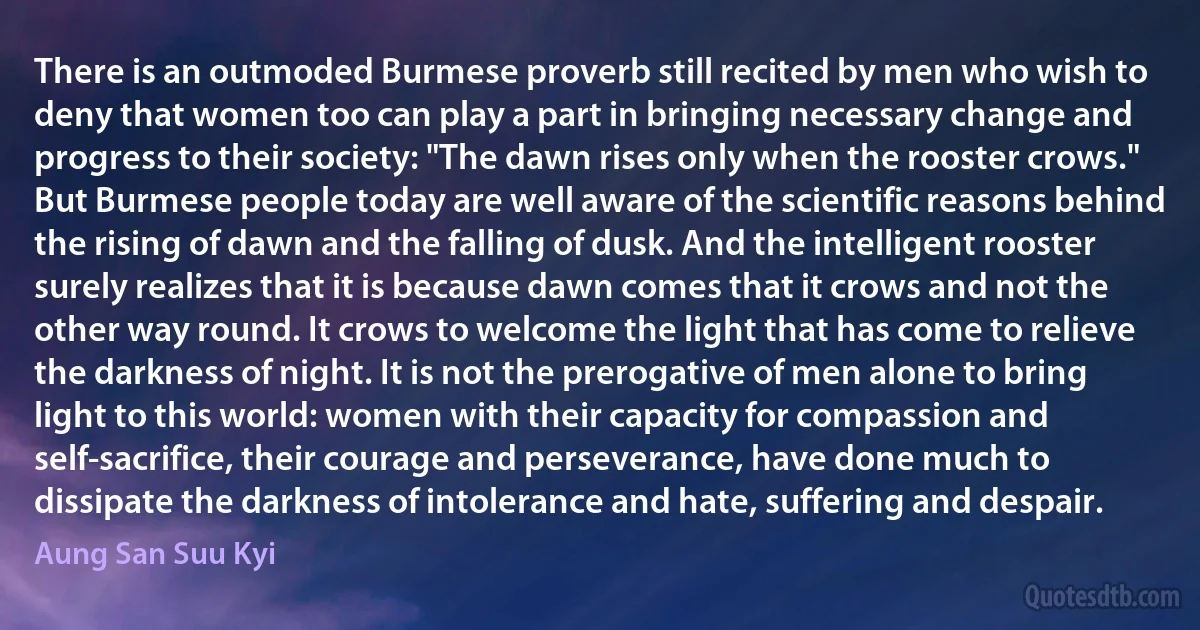
There is an outmoded Burmese proverb still recited by men who wish to deny that women too can play a part in bringing necessary change and progress to their society: "The dawn rises only when the rooster crows." But Burmese people today are well aware of the scientific reasons behind the rising of dawn and the falling of dusk. And the intelligent rooster surely realizes that it is because dawn comes that it crows and not the other way round. It crows to welcome the light that has come to relieve the darkness of night. It is not the prerogative of men alone to bring light to this world: women with their capacity for compassion and self-sacrifice, their courage and perseverance, have done much to dissipate the darkness of intolerance and hate, suffering and despair.
Aung San Suu KyiRelated topics
behind burmese change comes courage crows darkness dawn done falling hate women men light necessary night people perseverance play prerogative proverb rising rooster round self-sacrifice suffering way welcome well wish world todayRelated quotes
Of course a war is entertaining. The immediate fear and suffering of the humans is a legitimate and pleasing refreshment for our myriads of toiling workers. But what permanent good does it do us unless we make use of it for bringing souls to Our Father Below? When I see the temporal suffering of humans who finally escape us, I feel as if I had been allowed to taste the first course of a rich banquet and then denied all the rest. It is worse than not to have tasted it at all. The Enemy, true to His barbarous methods of warfare, allows us to see the short misery of His favourites only to tantalize and torment us - to mock the incessant hunger, which, during this present phase of great conflict, His blockade is admittedly imposing.

C. S. Lewis
But O Sarina come with me to my bed of woes, let me love you gently in the night, long time, we got all night, till dawn, till Juliet's rising sun and Romeo's vial sink, till I have slaked my thirst of Samsara at your portal rosy petal lips and left saviour juice in your rosy flesh garden to melt and dry and ululate another baby for the void, come sweet Sarina in my naughty arms, be dirty in my clean milk, and I'll detest the defecate I leave in your milky empowered cyst-and-vulva chamber, your cloacan clara file-hool through which slowly drool the hall-gyzm, to castles in your hassel flesh and I'll protect you trembling thighs against my heart and kiss your lips and cheeks and Lair and love you everywhere and that'll be that...

Jack Kerouac
Ansara was sprinting up the tunnel, increasing the gap, but Moore was beginning to slow as he heard the thundering boots of men coming down the staircase behind them. He stopped, spun around, and dropped onto his belly as, lit by the flickering light from the tunnel entrance, a figure rushed forward, arm extended. For just a heartbeat Moore glimpsed his assailant's face: the cartel truck's driver.
Propped up on his elbows now, Moore fired once into the figure's chest, the round booting him sideways into the panels before he fell onto his back.
From behind him came two more men, the rest of the weapons-transfer crew, their Belgian-made cop-killer pistols flashing, the shots booming through the tunnel as one 5.7x28-millimeter round struck the pipe near Moore's elbow.

Tom Clancy
Thus we must carefully distinguish between two kinds of reality, one which has an individual character, and one which has a universal appearance... It is, however, wrong to think that the non-figurative artist finds impressions and emotions received from the outside useless, and regards it even as necessary to fight against them... It is equally wrong to think that the non-figurative artist creates through 'the pure intention of his mechanical process', that he makes 'calculated abstractions' and that he wish to 'suppress sentiment not only in himself but in the spectator'... It is thus clear that he has not become a mechanic, but that the progress of science, of technique, of machinery, of life as a whole, has only made him into a living machine, capable of realizing in a pure manner the essence of art.

Piet Mondrian
The softer you find your child is, the more you are to seek occasions, at fit times, thus to harden him. The great art in this is, to begin with what is but very little painful, and to proceed by insensible degrees, when you are playing, and in good humour with him, and speaking well of him: and when you have once got him to think himself made amends for his suffering by the praise is given him for his courage; when he can take pride in giving such marks of his manliness, and can prefer the reputation of being brave and stout, to the avoiding a little pain, or the shrinking under it; you need nor despair in time and by the assistance of his growing reason, to master his timorousness, and mend the weakness of his constitution.

John Locke
